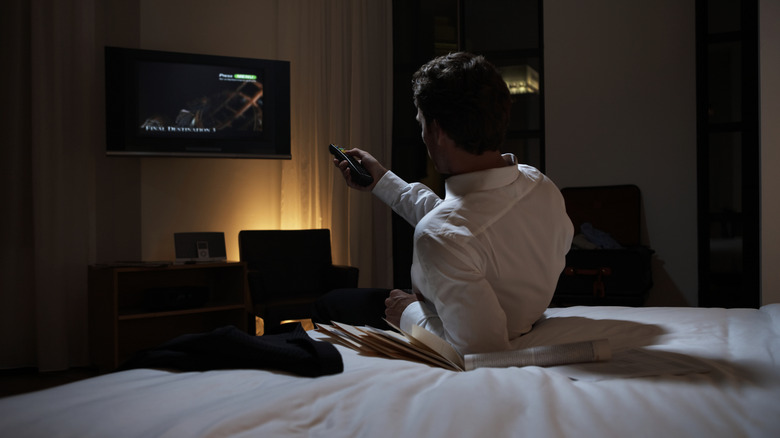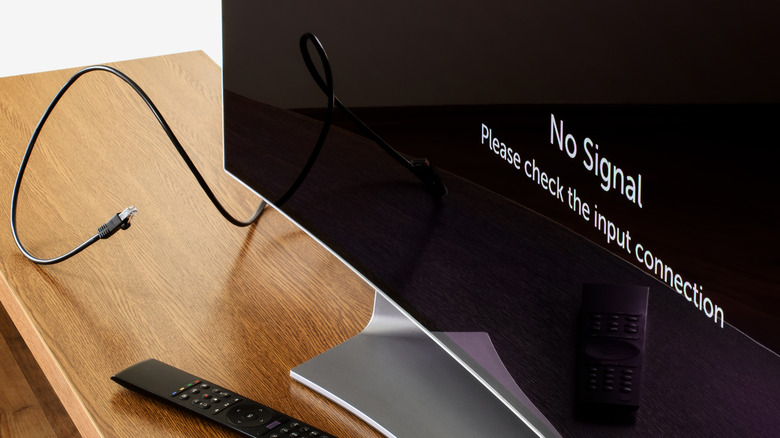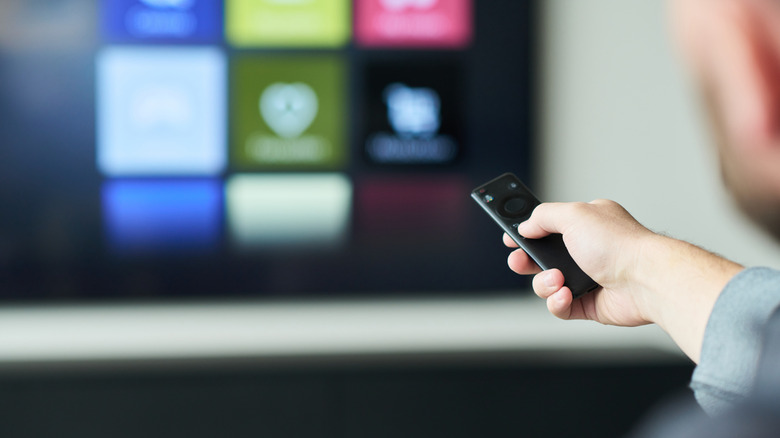How To Protect Your Privacy When Using A Hotel's Smart TV
Sometimes the need for feeling secure in a hotel room doesn't just extend to locks on the door but also to the security of one's personal information. In order to provide the most comfort and familiarity to their guests, many modern hotels have become outfitted with Smart TVs. While this can be very convenient for those who wish to pick up where they left off on their favorite shows or search the web with ease, it can also be a liability for those who wish to keep their private information private.
Smart TVs belong to a type of technology known as IoT (Internet-of-Things) devices that connect and share data between other such capable devices in a network. Devices such as these are becoming ubiquitous within the public landscape, and especially within hotels. While the proposed intent of these devices is to provide a uniquely personalized experience, key to that personalization involves mining data from IoT devices based on search history, viewing habits and even voice recognition.
With the advent of the "smart hotel", more IoT devices will be implemented into hotel rooms for the sake of a deeply automated and personalized experience. Therefore, it is important for the customer to be aware of how they can protect their privacy. While maybe unintentionally, most Smart TVs in hotel rooms are not set up to block some of the more intrusive features used by manufacturers and third parties for data mining. But just like finding ways to make yourself feel safer when alone in a hotel room, there are still ways to adjust the set in one's room to ensure that anyone wary of their privacy can achieve peace of mind.
Sometimes the easiest way to stay private is to simply unplug or use your own devices
ACR, or Automatic Content Recognition, technology in Smart TVs is utilized to obtain device settings, location, voice commands (usually through the remote), app usage statistics and viewing habits. Some Smart TVs are even made with cameras that have the potential to be used for spying if not properly disabled. Since a lot of hotel TVs aren't initially set up to prohibit this tracking, your best bet for peace of mind might just be to unplug the set completely. Simply turning it off may not suffice, as VUI or Voice User Interfaces on certain devices could still potentially pick up one's voice even if the device is not in use or powered off.
Also, if the room has provided charging utilities for your phone or laptop, it's probably best practice to use your own charging implements unless it's in the case of an emergency. While most public Smart TVs also come equipped with internet browsers, it's also probably better to use one's own laptop or similar devices for personal browsing. In order to avoid this, sometimes the best and safest way to enjoy the Internet on your hotel TV is to cast it from your phone, depending on the make, model and capability of the TV. Another good practice is to be absolutely positive that if you do use included apps on Smart TVs that you thoroughly log out of all your accounts before leaving the hotel. Just like remembering to take all of your belongings upon checkout, remembering to exit out of any apps you used is just as important.
There are steps to take to turn on privacy settings with some of the most popular brands of Smart TVs in hotels
One of the most popular brands of Smart TVs used in hotels are LG TVs. The first step to disabling some of the intrusive features is to head to the Settings menu, click on All Settings, Support, Privacy & Terms, and finally to User Agreements. This is where you can find the policies and controls for features like Interest-Based-Cross-Device Advertising and "Who. Where. What?" which enables targeted advertising based on search history as well as viewing suggestions. Here, you also will find an option labeled Do Not Sell My Personal Information to toggle on and off. Disabling this feature will limit the selling of your information by third parties, but it doesn't completely block it either if you choose certain built in apps like Live Plus or LG Channels.
Another popular Smart TV platform in hotel rooms is Google TV which has mostly replaced Android TV. While Google TV itself doesn't implement ACR technology, many television brands that carry it like Sony, Phillips and Hisense do. The app also does mine data for its smart TV platform, which is unavoidable if you wish to use the service. However, while setting the TV up you can opt out of the service and still have access to live TV, movies and your streaming apps. While it is indeed a concession to give up some of the amenities offered up by smart TVs, for some it is worth it to know that their private information is secure.


